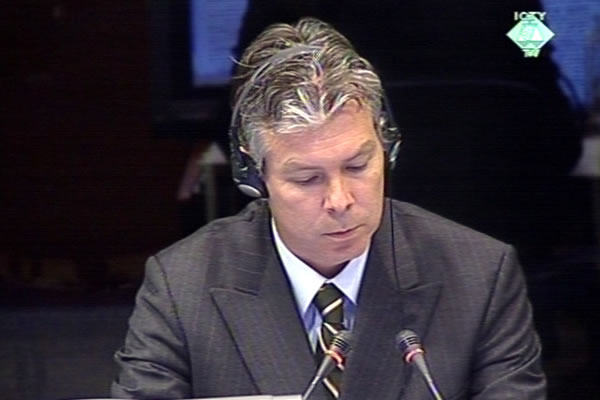Home
RADOVAN KARADZIC’S ‘PEACE-MAKING EFFORTS’
Radovan Karadzic continued his cross-examination of the prosecution military expert Ewan Brown. Karadzic insisted that in 1992 he personally sent a number of appeals and orders to protect non-Serb civilians. The witness said that ‘sending documents is one thing, and implementing them is something entirely different’. Karadzic’s motion for the adjournment of his trial for one month was rejected
 Ewan Brown, witness at the Radovan Karadzic trial
Ewan Brown, witness at the Radovan Karadzic trial Former Republika Srpska president Radovan Karadzic claimed in the cross-examination of Ewan Brown that from April to December 1992 he issued about 20 appeals and orders to protect non-Serb civilians. Karadzic objected that the witness didn’t take those documents into consideration when he wrote his expert analysis on the military situation in the Bosnian Krajina in 1992.
Brown was not aware of Karadzic’s appeals and orders, but he noted that when he went through the 1st Krajina Corps documents he noticed that some of them speak about respecting the Geneva Conventions; he mentioned this fact in his report. ‘However, sending documents is one thing, and implementing them is something entirely different’, the witness stated.
Karadzic showed the witness the letter he sent to the UN Secretary General Boutros-Ghali on 13 June 1992. In the letter, Karadzic notes that the RS authorities ‘renounce’ the paramilitary groups that refused to be put under the VRS command. According to the witness, this letter reflected the policy whereby paramilitary groups were acceptable for as long as they were willing to be under the control of the Serb authorities. The letter didn’t state that the paramilitary groups should be prosecuted for crimes they committed, the witness said.
The witness listed several incidents in which the perpetrators were identified, according to the documents of the 1st Krajina Corps he had analyzed yet no measures were taken against them. Brown mentioned the example of Lieutenant Bozidar Popovic, commander of the Manjaca prison camp, who was never prosecuted, although ‘everybody knew’ that the conditions in the prison camp were horrible and that terrible things happened there, including beatings and killings of prisoners.
Karadzic argued that in the Sana River valley – in Prijedor, Sanski Most and Kljuc – in May 1992 Muslim forces carried out ‘synchronized attacks’ on the Serb army and civilians. Only after the Muslims ‘attacked them from the back’ did the army join in the combat operations, Karadzic said. The witness was adamant that in mid-April and in May 1992 the Serb forces seized power in those municipalities in line with the SDS plans and the conclusions of the Serb Assembly from late March 1992. As the witness said, a series of actions in which the non-Serb population was disarmed ensued; the purpose was to establish full control of the territory. The 1st Krajina Corps took part in those actions.
Karadzic will continue cross-examining the prosecution military expert Ewan Brown tomorrow, after the testimony of another protected prosecution witness.
In the meantime, the Trial Chamber dismissed Karadzic’s motion for the adjournment of the trial for one month before the prosecution starts calling evidence on the genocide in Srebrenica. Karadzic asked for the adjournment in order to review the relevant documents which were disclosed to him with delay by the prosecution in late 2010 and early 2011.
In its decision, the Trial Chamber found that Karadzic failed to explain why he hadn’t already reviewed the documents that had been in his possession for almost a year. The Trial Chamber also noted the trial had been adjourned for nine weeks from March to May 2011, and the accused was supposed to have gone through the documents that had been disclosed to him with delay, including the documents about Srebrenica.
Linked Reports
- Case : Karadzic
- 2011-11-18 PRISON CAMPS WERE PART OF POLICY OF ETHNIC SEPARATION
- 2011-11-17 MILITARY IMPLEMENTATION OF STRATEGIC GOALS
- 2011-11-16 PREPARATIONS FOR JOURNALISTS’ VISIT TO PRISON CAMPS
- 2011-11-23 KARADZIC: ‘EVACUATION’, NOT ‘EXODUS’
- 2011-11-24 THOSE WHO FLED, THOSE WHO WERE EXPELLED AND THOSE WHO WERE DESPERATE
- 2011-11-24 EXECUTION IN ORAHOVAC
